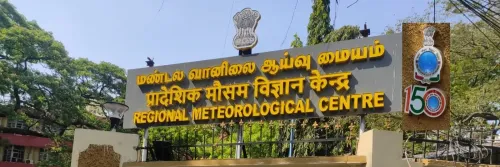Syrian Forces Intensify Operations Against Former Government and Drug Traffickers

Synopsis
Key Takeaways
- Continued military operations against Assad's remnants.
- Deployment of heavy weaponry and drones reported.
- Targeted actions in Homs Province and surrounding areas.
- Comprehensive efforts to close smuggling routes.
- Significant international implications amid ongoing conflicts.
Damascus, Feb 7 (NationPress) The interim Defence Ministry of Syria has announced that its forces are actively pursuing operations against the remnants of the ousted Bashar al-Assad government and drug traffickers along the Syrian-Lebanese border.
As reported by the Syrian Observatory for Human Rights, a war monitoring group, on Thursday, the military deployed heavy weaponry and drones to target entrenched fighters associated with the Lebanese militant group Hezbollah and a drug cartel.
The military focused on militant strongholds in the village of Hawik in the central province of Homs, using artillery, which reportedly led to casualties and the apprehension of fighters from both sides, according to Xinhua news agency.
The observatory further reported that the offensive spread across multiple border villages and rugged terrains, resulting in at least one fatality.
In an update, the Homs Province media office confirmed that security forces initiated a comprehensive operation to shut down illicit arms and contraband smuggling routes to mitigate illegal activities that jeopardize stability in both Syria and Lebanon.
According to this office, Syrian authorities have detained numerous individuals believed to be involved in smuggling activities and have confiscated significant quantities of weapons and contraband.
On December 8, 2024, the regime of Bashar al-Assad collapsed following a ten-day offensive by rebel forces, which began with the capture of Aleppo on November 30.
This armed coalition was spearheaded by the Islamist militant group Hayat Tahrir al-Sham (HTS) and the Turkish-supported Syrian National Army (SNA).
The turmoil concluded more than fifty years of the Assad family's dominance in Syria and reinstated dynamics in the Syrian civil war that had been stagnant since 2011.
In the wake of Damascus' fall to HTS and aligned forces, deposed President Assad fled to Moscow.
During the offensive, rebels also liberated prisoners held by the Assad regime while advancing into new territories.
Notably, Russia, Iran, and Hezbollah—traditional backers of Assad's administration—did not provide substantial assistance to his Syrian Arab Army (SA) during this rebel offensive.
Simultaneously, the Kurdish-led Syrian Defense Forces (SDF), which govern portions of northeastern Syria, continue to engage in conflicts with Arab tribes alleging discrimination, while Turkey and its allied forces persist in their assaults on Kurdish fighters.
Factional disputes have allowed the self-proclaimed Islamic State to sustain its presence and conduct attacks.
Moreover, Israel routinely strikes Iranian and Syrian military installations in Syria and has escalated these attacks, including strikes on Damascus and Aleppo airports, since Hamas’s assault on Israel in October 2023.









